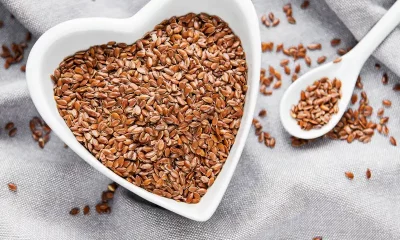Health
What are the benefits of parsley?

Discover the benefits of parsley for Health.
Parsley is one of the most popular herbs in the kitchen, as it brings a touch of color and flavor to meals. Of Mediterranean origin, parsley has managed to transcend borders until it is present in all corners of the world.
It is rich in calcium, folic acid, iron, and vitamins A, C, and K. If you want to know all the benefits that parsley has, you just have to keep reading.
Health Benefits of parsley
Parsley, in addition to being an excellent condiment for meals, is also an excellent complement to have a healthy life. This is because parsley provides great health benefits.
Provides a large number of flavonoids
It helps fight diseases and protect the body from the risk of suffering from many pathologies thanks to its antioxidant effects.
Among its main contributions to the body are beta-carotene, alpha-carotene, luteolin, lycopene, and apigenin.
In addition, they help slow the aging of cells by eliminating free radicals, reducing inflammation and the risk of diseases associated with old age.
Contains essential oils
It provides a large number of essential oils to the body that contains volatile components such as limonene, myristicin, eugenol, and alpha-thujene, which help fight cancer, strengthening the immune system, and helping it respond better.
It also delays the growth of tumors, fights carcinogens, and neutralizes oxidative stress, which is why it is considered a chemoprotective plant, as it also helps to keep DNA free from damage, stopping mutations at the cellular level and promoting the death of cells. damaged cells.
It is diuretic
Parsley acts as a quite effective natural diuretic that helps reduce bloating by stimulating kidney production, helping to eliminate excess fluid that may be swelling the abdomen, while helping to preserve digestive health.
Fluid retention at the abdominal level can cause problems in the digestive process, which is why parsley is quite useful to relieve stomach discomfort while reducing inflammation and helping to obtain a visibly flatter abdomen.
Improves urinary tract health
Parsley is highly effective in helping to reduce kidney stones and their subsequent excretion naturally. Relieves symptoms of urinary and gallbladder infections.
Even in cases of venereal diseases and jaundice, it has been scientifically proven that the root and leaves of parsley help the spleen and liver function.
Improves digestion
It is one of the most common uses of parsley when it is used as a medicinal plant, as it helps to relieve stomach symptoms quite effectively. It helps reduce gas, nausea, constipation, bloating, and even in cases of indigestion.
Parsley helps the production of bile and gastric juices, thanks to its essential oils, which help improve the absorption of nutrients that come from food. Its essential oil can be used applied directly on the abdomen or as part of baths.
It is antibacterial and antifungal
Parsley has antibacterial and antifungal properties that help fight infections and eliminate bacteria, which is why it is widely used to preserve oral and dental health, as well as that of the skin, being a perfect ally to help eliminate acne and the bacteria that cause it.
It eliminates fungi effectively, being applied directly on the affected area, however, the essential oil of parsley can be irritating, so its application is recommended, diluting it in another oil that serves as a base, such as oil of olive, coconut, or almonds.
Due to these characteristics, parsley is present in the formulation of many soaps, creams, perfumes, and detergents.
Fight bad breath
Thanks to its antibacterial properties, previously mentioned, parsley helps fight the bacteria that cause bad breath, helping to refresh it naturally.
Chewing a parsley leaf for a few minutes is more than enough to eliminate any trace of bad breath that you may have.
Protect bones
Parsley is highly rich in vitamin K, which helps to preserve bone density, together with calcium, vitamin D, and phosphorus.
Stimulates the immune system
Thanks to its high content of vitamin C, which acts together with phosphorus, magnesium, and vitamin D. Its antioxidants, among which vitamin A stands out, help to increase the defenses naturally.
Taking all these vitamins and minerals helps maintain optimal intestinal health while reducing inflammation, which means a lower risk of diseases such as arthritis, arteriosclerosis, diabetes, asthma, and colon cancer.
Improves eye health
Parsley helps protect and improve eye health thanks to its vitamin A content, which also helps maintain healthy skin. The high content of carotenoids and beta-carotene help promote visual health while protecting the cornea and retina from the damage to which they are exposed with the passage of age.
That is why parsley helps prevent the appearance of various visual disorders caused by cell degeneration, such as cataracts. It also helps prevent skin cancer by protecting the skin from UV rays.
Helps protect the heart
Parsley provides folate, which is essential for maintaining heart health, as well as B vitamins that protect you from disease. Parsley provides large amounts of folic acid that converts homocysteine, a substance that, if left unchecked, can be detrimental to heart health.
This substance can damage blood vessels and cause a stroke or heart attack if left unchecked, which parsley does effectively.
Balances hormones
The consumption of parsley helps to balance hormones, helping to reduce the incidence of other pathologies and improving fertility.
In addition, it helps to alleviate premenstrual symptoms, reduce colic, and, by providing folic acid, it helps to cover the amount of folate necessary for the correct formation of the neural tube during pregnancy, avoiding later problems in the fetus.
Health
13 Benefits of evening primrose oil and side effects

Table of Contents
Health
Side Effects of Taking Vitamin B12 Supplements

Table of Contents
Health
13 Benefits of sorrel and side effects

Table of Contents
- What is Sorrel?
- Health benefits of sorrel
- 1. Benefits of sorrel for digestion
- 2.- Benefits of sorrel for blood pressure
- 3.- Benefits of sorrel for eyes
- 4.- Energy and circulation
- 5.- Increases immunity
- 6.- Benefits of sorrel for skin
- 7.- Improves kidney health
- 8.- Promotes healthy bones
- 9.- Benefits of sorrel for Diabetes
- 10.- Prevents cancer
- 11.- Rich in vitamin A
- 12.- Treat Herpes Zoster
- 13.- Detoxifies the body
- Side effects of sorrel
- Conclusions on the health benefits of sorrel
- Discover the 13 shocking health benefits of Sorrel and side effects.
The benefits of Sorrel as it is known in some parts of the world to enhance human health, include, among other things, supporting healthy digestion, controlling blood pressure, improving vision, supplying energy and helping blood circulation, boosts immunity, improves skin health, promotes healthy bones, controls diabetes, prevents cancer, treats herpes zoster, detoxifies the body and body with vitamin A.
- What is Sorrel?
- Health benefits of sorrel
- 1. Benefits of sorrel for digestion
- 2.- Benefits of sorrel for blood pressure
- 3.- Benefits of sorrel for eyes
- 4.- Energy and circulation
- 5.- Increases immunity
- 6.- Benefits of sorrel for skin
- 7.- Improves kidney health
- 8.- Promotes healthy bones
- 9.- Benefits of sorrel for Diabetes
- 10.- Prevents cancer
- 11.- Rich in vitamin A
- 12.- Treat Herpes Zoster
- 13.- Detoxifies the body
- Side effects of sorrel
- Conclusions on the health benefits of sorrel
What is Sorrel?
Sorrel is an annual, bushy, and perennial herb that comes from the Buckwheat family.
It breeds in a wide range of climates, so it can be found in every type of climate, in different regions of the world.
It is also used to make a popular drink known as Karkade, which comes from Egypt and is well known for its health benefits.
The different parts of this plant are used to make soups, spices, sauces, medicines, and jams.
The most common type of sorrel that has the highest value is Hibiscus Sabdariffa, commonly known as Roselle, Red Sorrel, or Jamaica Sorrell.
Hibiscus is generally grown to add flavor to food due to its strong taste, but it has several benefits such as improving vision, regulating blood pressure, increasing heart health, etc.
The powerful tangy flavor of the plant comes from oxalic acid, which is similar to kiwis or wild strawberries.
Oxalic acid is known to be toxic if taken in large doses, but it is completely safe when consumed in small, controlled portions.
Sorrel contains large amounts of dietary fiber and is loaded with vitamin C, in addition to vitamin A, vitamin B6, potassium, calcium, and magnesium.
It is considered an excellent antimicrobial and antioxidant, which is why it is the main component of the popular Essiac tea.
In terms of advantageous organic ingredients, it is made up of flavonoids, polyphenolic acids, and anthocyanins.
All these elements present in the Sorrel plant make it surprisingly beneficial for the health of an individual.
Health benefits of sorrel
1. Benefits of sorrel for digestion
The high level of fiber present in most types of sorrel means that your digestive health can be improved by incorporating these plants in your salads and soups.
Dietary fiber adds substance to food as it passes through the digestive system, improving your gastrointestinal health and minimizing conditions such as bloating, diarrhea, constipation, and cramps, along with gastrointestinal problems.
Dietary fiber can also help lower total cholesterol in the body, reducing the risk of atherosclerosis, strokes, and heart attacks.
2.- Benefits of sorrel for blood pressure
Sorrel contains a high level of potassium (a single cup contains 15% of your recommended daily intake), which is a key mineral for a healthy human body.
Potassium is a vasodilator and is also crucial for regulating fluid balance throughout the body.
This implies that potassium minimizes stress on the cardiovascular system by calming the arteries and blood vessels.
Lowering blood pressure minimizes the risk of dangerous or even fatal blood clots and excess stress on the heart that can lead to coronary heart disease and other cardiovascular complications.
3.- Benefits of sorrel for eyes
Vitamin A is a vital vitamin found in sorrel or sorrel benefits and has been closely linked to improved eyesight and a reduction in cataracts and macular degeneration.
Beta-carotene, a branch of vitamin A, which acts as an antioxidant and, when combined with other key antioxidant elements present in the body, can significantly improve eye health and prevent age-related problems.
4.- Energy and circulation
The high levels of iron in sorrel or sorrel benefits mean that it increases red blood cell production and prevents iron deficiency (anemia).
Improved circulation increases oxygen levels in important organs throughout the body, stimulates hair growth, increases energy levels, and speeds up the healing process (in combination with the protein content found in sorrel).
5.- Increases immunity
The presence of vitamin C in sorrel or sorrel benefits is quite impressive (one cup of the plant has 106% of your recommended daily intake), which means that your immune system can be optimized.
Vitamin C is also known as ascorbic acid, it increases the production of white blood cells and stimulates the immune system, which is the first line of protection against pathogens and other free radicals present in the body.
6.- Benefits of sorrel for skin
Sorrel leaf is packed with vitamin C, which is extremely important in protecting our skin from wrinkles and tightening it.
In addition to that, sorrel leaves are excellent for relieving itch and ringworm due to their anti-allergic and antimicrobial properties.
7.- Improves kidney health
Red sorrel and sheep sorrel have been found beneficial in a study published by the University of Washington in Saint Louis.
The study confirms that the leaves can cure acute diseases such as kidney stones and cleanse the urinary tract if the patient consumes the juice of the leaves regularly. They also help prevent kidney stone formation and growth.
8.- Promotes healthy bones
A single cup of sorrel contains 123 mg of calcium. Adequate amounts of calcium in your diet help keep your teeth and bones strong and healthy. Calcium is also very important for transmitting messages from your brain to the rest of the body; a calcium deficiency increases the risk of abnormal heartbeats and osteoporosis, so be sure to stock up on sorrel and consume it in controlled portions.
9.- Benefits of sorrel for Diabetes
Sorrel comes from the oxalis family, which has been closely linked to improving diabetes conditions and improving heart health.
This is likely due to the presence of organic elements and anthocyanins in sorrel, which interact with virtually every system in the body to improve its health and functionality.
10.- Prevents cancer
Although research is ongoing on the antioxidant components of sorrel, there is still a good deal of evidence to suggest that the plant contains flavonoids, polyphenolic compounds, and anthocyanins, all of which act as antioxidants.
The abundance of antioxidants is quite effective in fighting free radicals and eliminating them before they can mutate healthy cells to cancerous ones.
11.- Rich in vitamin A
One cup of sorrel has 164 IU of vitamin A, which is critical for your body’s optimal functions.
Vitamin A helps fight bacteria and viruses that enter your body and make you sick. In addition, it helps with reproduction, cell division and fights free radicals.
12.- Treat Herpes Zoster
The Varicella-zoster virus is a stubborn virus that causes shingles that can remain dominant for years.
The Chinese used the benefits of red sorrel as a topical and oral treatment for shingles and found it to be very effective.
13.- Detoxifies the body
Our bodies need to detox from time to time to keep them working properly. Herbal teas are good detoxifiers, but so is red sorrel.
Sorrel plays a key role in xenobiotic metabolism and detoxification, and its juice is known to flush the body with toxins.
Side effects of sorrel
Sorrel can induce stomach upset. In larger doses, sorrel can induce damage to the kidneys, liver, and digestive organs.
Conclusions on the health benefits of sorrel
All in all, no doubt incorporating sorrel into your daily diet can help you maintain your physical and psychological health.
Related Searches….
Benefits of sorrel and ginger
Sorrel benefits for skin
What are the side effects of sorrel
How much sorrel is safe to drink
Sorrel benefits for hair
Is sorrel good for high blood pressure
Benefits of sorrel and ginger tea
Sorrel detox
Is sorrel acidic or alkaline
Sorrel drink
Is sorrel good for anemia
Sorrel nutrition
Sorrel tea
Sorrel herb
-

 Benefits4 months ago
Benefits4 months agoThe Benefits of Joining Gym Lumolog – Improve Your Fitness & Health
-

 Food1 year ago
Food1 year ago10 + Benefits of carrot juice and side effects
-

 Health1 year ago
Health1 year ago50 Super Healthy (And Very Often Cheap) Foods
-

 Health1 year ago
Health1 year ago5 Shocking health benefits of kinkeliba and side effects
-

 Health1 year ago
Health1 year ago15 health benefits of soursop leaves tea and side effects
-

 Food1 year ago
Food1 year ago8 shocking benefits of leek juice and side effects
-

 Health1 year ago
Health1 year ago15 Benefits of lipton tea and side effects
-

 Health1 year ago
Health1 year agoBenefits of guava leaves Sensually












